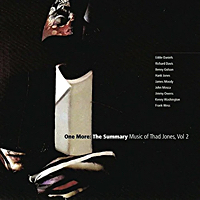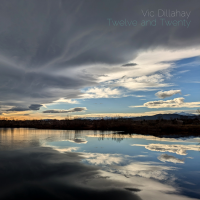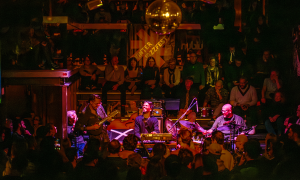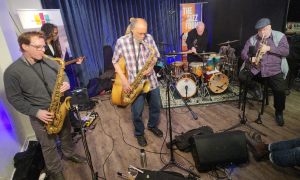Home » Jazz Articles » Live Review » Other Dimensions in Music at the JVC Jazz Festival in Pa...
Other Dimensions in Music at the JVC Jazz Festival in Paris, Oct. 19-20
The years of playing together have resulted in an almost telepathic understanding between the band members where the slightest gesture can be picked up
The quartet members have been together since the early 1980s, playing as and when their increasingly busy schedules allow. Their credo, like the AACM's Great Black Music: Ancient to the Future, is that repertory knows no limits. The difference is that they operate totally within in a framework of spontaneous, rather than preconceived, composition. And it is this openess that provides the link, missing in some people's minds, between free jazz and other styles of jazz, blues, funk, reggae and African music. During this short European tour, I heard it all and more in a dizzying kaleidoscopic melange.
The final two nights of the tour at the Sunset Club on Rues des Lombards in Paris, as part of the JVC Jazz Festival, allowed an extended view of their creative process. The long, low-ceilinged basement of the Sunset, moreover, boasts excellent acoustics, which permitted intimate communing with the music.
On the first night the band was supplemented by special guest Dick Griffin on trombone. Later the small stage became even more crowded with the addition of Rasul Siddik on trumpet and Herve Samb on electric guitar.
The three excellent and varied sets each night consisted of a single free flowing improvisation, stretching between thirty minutes and an hour. The one exception was the second set of the first night when the musicians broke into two pieces, with all the guests sitting in for the second half. The expansion meant there was less space for internal interplay, but it afforded a luxuriant horn chorus against which to pitch solos, sounding at times like an abstracted Dixieland band, a feeling accentuated by a forceful Parker fast two-step.
Everyone had a lot of fun, with testifying solos emerging from the horn cacophony, especially Griffin's slow-preaching trombone multiphonics, closing to a foot-stomping finale. But if anything the second night was even better than the first. The band, without guests, seemed more focussed and featured starker contrasts—between loud and quiet, horns and rhythm, wild and thoughtful—and there was more space for bass/drum alchemy.
The years of playing together have resulted in an almost telepathic understanding among the band members so that the slightest gesture by one musician can be picked up by the others, causing the performance to switch track like a flock of birds turning instantaneously as one. The horns of Messrs Campbell and Carter intertwined in conversational unisons throughout, punctuating each other's solos, picking up and trading motifs and generally delighting in an aural game of tag.
The travails of international travel restricted Carter's usual arsenal of horns to alto saxophone, flute and trumpet, but it was a pleasure to hear so much of his cool unhurried alto. His playing was frequently understated and lyrical, his solos constructed in bursts with pauses as he let the rhythm assert prominence, before issuing another melancholic, keening phrase. There were more agitated sections, but with much less screaming than you might imagine from the veteran free jazzer's track record with other radical collectives, such as TEST.
Roy Campbell was a master of transformation—often hot in contrast to Carter's cool—but also boppish or bluesy. He varied the textures by switching between pocket trumpet, trumpet, flugelhorn, flute and a variety of toys, whistles and shakers, and also used an array of mutes or even just his hand to modulate his tone.
Drake and Parker represent the apogee of the free jazz rhythm section. Drake stirred momentum into the rhythmic stew but didn't have to play it all. An accent on toms here or a pattern on snare there sufficed to imply a structure or the turnaround, but in a song without bars, like a free-form Ed Blackwell. He fits well with Parker because both are comfortable with constantly-changing patterns, sliding in and out of grooves, meshing only to break up and then reform. Parker was especially inventive on his cut-off bass, deploying a panoply of upbeat rhythmic shifts to redirect the flow.
It was fascinating to see how the lead switched among members of the group, revealing how the performance was shaped. After one sprightly melodic solo from Campbell, the tall gaunt Carter joined on alto, blowing soft and long. Straightaway Campbell matched him, and the rhythm slowed with Drake switching to brushes and lithely sweeping his skins. Elsewhere a repeated arco pattern from Parker summoned rhythmic embellishment from Drake and prompted glorious riffing from the tandem horns.
Solos were used to maintain the flow of a piece. As a passage came to its natural conclusion, bass or drums would continue, hewing a solo statement until one or more of their comrades chose to rejoin and the caravan moved on. Infrequently the tactic backfired, as at the end of one set: the beatific Drake maintained the thread with a steady tick-tocking on the rim of his snare. But this time no one rejoined so Drake played slower and slower, until he chuckled that he could go on all night, then defeated expectations by continuing in the same vein, before finally slowing to a halt with laughter all round.
There were numerous equally memorable passages. A striking ethnic polyphony began one set with Drake on frame drum, Carter on flute, Campbell—resplendent in a rich blue shirt with a yellow Egyptian motif—on wood flute, and Parker on musette (a North African double reed instrument). Then Carter bobbed back and sideways as he added a wordless chant. Later his muted trumpet intertwined with Campbell's flugelhorn over lyrical bass, before the conclave of master musicians swept onwards in a glorious concatenation.
At one point Parker's booming bass notes vibrated out as he slid his fingers down the fret before morphing into a sanctified riff accented by Drake's cymbals and Campbell's soulful muted pocket trumpet. Carter again added ghostly vocal backing before moving to flute, for a dancing flute and drum duet. When Carter's urgent clarion alto calls later culminated in a repeated phrase, Campbell picked up his pocket trumpet and played the same phrase, anticipating simultaneous improvisation from the sparring horns before both ended on a high squeal.
Both nights were recorded by French label Marge, with the musicians responsible for selecting the final cut. They will have a hard job as any of the six sets would make a wonderful release. I felt privileged to have been able to witness it all going down.
Tags
PREVIOUS / NEXT
William Parker Concerts
Support All About Jazz
 All About Jazz has been a pillar of jazz since 1995, championing it as an art form and, more importantly, supporting the musicians who make it. Our enduring commitment has made "AAJ" one of the most culturally important websites of its kind, read by hundreds of thousands of fans, musicians and industry figures every month.
All About Jazz has been a pillar of jazz since 1995, championing it as an art form and, more importantly, supporting the musicians who make it. Our enduring commitment has made "AAJ" one of the most culturally important websites of its kind, read by hundreds of thousands of fans, musicians and industry figures every month.



























